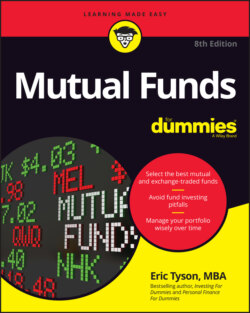Читать книгу Mutual Funds For Dummies - Eric Tyson - Страница 38
A (BRIEF) HISTORY OF MUTUAL FUNDS
ОглавлениеMutual funds date back to the 1800s, when English and Scottish investment trusts sold shares to investors. Funds arrived in the United States in 1924. They were growing in assets until the late 1920s, when the Great Depression derailed the financial markets and the economy. Stock prices plunged and so did mutual funds that held stocks.
As was common in the stock market at that time, mutual funds were leveraging their investments — leveraging is a fancy way of saying that they put up only, for example, 25 cents on the dollar for investments they actually owned. The other 75 cents was borrowed. That’s why, when the stock market sank in 1929, some investors and fund shareholders got clobbered. They were losing money on their investments and on all the borrowed money. But, like the rest of the country, mutual funds, although bruised, pulled through this economic calamity.
The Securities Act of 1933 and the Investment Company Act of 1940 established ground rules and oversight of the fund industry by the Securities and Exchange Commission (SEC). Among other benefits, this landmark federal legislation required funds to register and have their materials be reviewed by the SEC before issuing or selling any fund shares to the public. Funds were required to disclose cost, risk, and other information in a uniform format through a legal document called a prospectus (see Chapter 8). Over the decades, the SEC has further beefed up required disclosures in prospectuses.
During the 1940s, ’50s, and ’60s, funds grew at a fairly high and constant rate. From less than $1 billion in assets in 1940, fund assets grew to more than $50 billion by the late 1960s — more than a 50-fold increase. Before the early 1970s, funds focused largely on investing in stocks. Since then, however, money market mutual funds and bond mutual funds have mushroomed. They now account for about 40 percent of all mutual fund assets.
Today, thousands of mutual funds manage about $27 trillion with exchange-traded funds holding another $7 trillion.
Are you, as the investor, going to do all these tasks and do them well? Nothing personal, but I doubt that you will. Even in the unlikely event that you could perform investment research as well as the best fund managers, don’t you value your time? A good fund management team happily performs all the required research for you, does it well, and does it for a fraction of what it costs you to do it haphazardly on your own.
